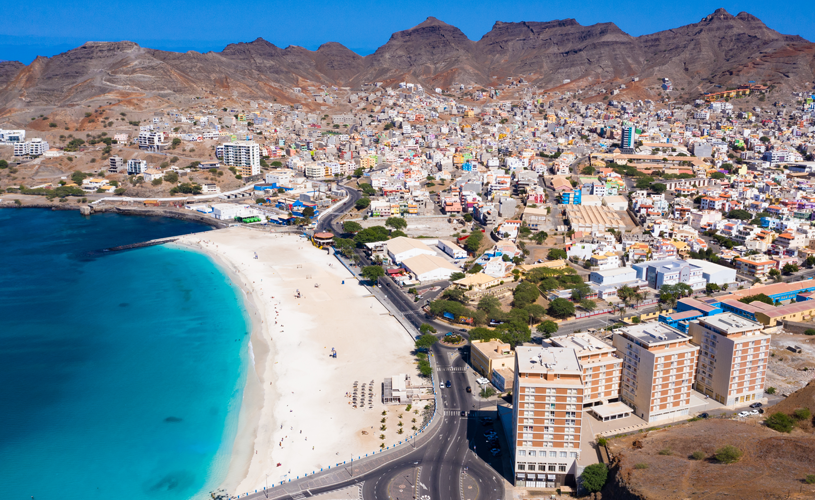Although COVID-19 has caused widespread travel restrictions, Eccles Global students have still found ways to gain professional experience on the international level. This summer, two Eccles Global students, Amanda Edwards and Peyton Williams, along with mentoring and support from Associate Director Cesar Sanchez, completed a consulting project for Cabo Verde’s Secretary of State for Innovation & Technical Training, Pedro Lopes.
The main goal of this group’s project was to identify the best ways for Cabo Verde’s entrepreneurs to connect with international Cabo Verdeans in order to access funding, mentorship, and other business resources. Through this project, Amanda, Peyton, and Cesar conducted interviews with nearly 50 people, including diaspora experts around the world, Pan-African Parliament members, Cabo Verdean entrepreneurs and professors, and professionals from Cabo Verde’s diaspora.
Peyton Williams:
I’m excited to share a bit about my experience working on this project for Cabo Verde’s government. At the beginning of the summer, my initial internship plans had been canceled as a result of COVID-19, so I didn’t expect to find any unique or interesting opportunities. Fortunately, I heard about this Cabo Verde virtual internship through an email from the Hinckley Institute of Politics, and it seemed like a fascinating opportunity.
At the start of the project, Cesar encouraged Amanda and me to research as much as possible about Cabo Verde’s culture, government, people, and economy. This research helped us understand Cabo Verde’s unique situation and served as a foundation for the rest of our analysis.
Cabo Verde is located off of Africa’s west coast and consists of 9 islands. Like many other African countries, Cabo Verde has a large diaspora, with the population of Cabo Verdeans living abroad significantly outweighing the country’s domestic population. Because of this, Cabo Verde’s government was interested in learning more about how to connect with these diaspora members. Specifically, they wanted my team to research the best ways for Cabo Verde’s entrepreneurs to utilize the diaspora for help with business development. Fortunately, as we found, Cabo Verde’s diaspora is more than willing to contribute to the development of their home country.
After my team researched Cabo Verde, we also looked into some of the most interesting diaspora policies and initiatives around the world. We researched policies and platforms from Lebanon, the Philippines, Nepal, and other countries, and identified a list of best practices that we presented to Cabo Verde’s government. Our next step was to learn about the specific functions we wanted this platform for Cabo Verde to include. To do this, we interviewed Cabo Verdeans in the diaspora and Cabo Verdean entrepreneurs (the target markets of this platform) and asked them for recommendations about how to best design this platform.
In the end, we identified three main functions:
-
Mentoring: Many Cabo Verdean entrepreneurs do not have an entrepreneurship education, so they need assistance with developing their business strategy. With the platform my team recommended, professionals from Cabo Verde’s diaspora could offer their expertise to help aspiring entrepreneurs develop their business plans, conduct market research, or even expand their businesses internationally.
-
Education: In a similar vein, this platform would host workshops and provide educational materials to help Cabo Verde’s entrepreneurs learn concepts like basic coding, how to price their products, and soft skills. These workshops would be video lectures taught by professors and professionals with relevant experience.
-
Funding: One of the major challenges entrepreneurs in Cabo Verde face is the difficulty of accessing working capital. This platform would enable entrepreneurs to list their products and business plans and to gather investments. Diaspora members could browse these investment options and identify interesting, innovative companies to contribute to. In this way, the diaspora will be able to contribute to their home country while also earning a return on their investments.
Along with these three main functions, this platform would also emphasize the impact that investments have on Cabo Verde’s development. The platform would be targeted directly at start-up companies that are working to develop Cabo Verde, and would showcase success stories.
At the end of this project, I feel like my team’s recommendations have the potential to make a major impact on Cabo Verde. Cabo Verde has such an involved diaspora, but there is not currently an easy way for international Cabo Verdeans to make an impact in their home country. With this platform, Cabo Verdeans would be able to directly finance innovation, a major step forward in the country’s development.
Payton Williams is an undergraduate student at the David Eccles School of Business.




